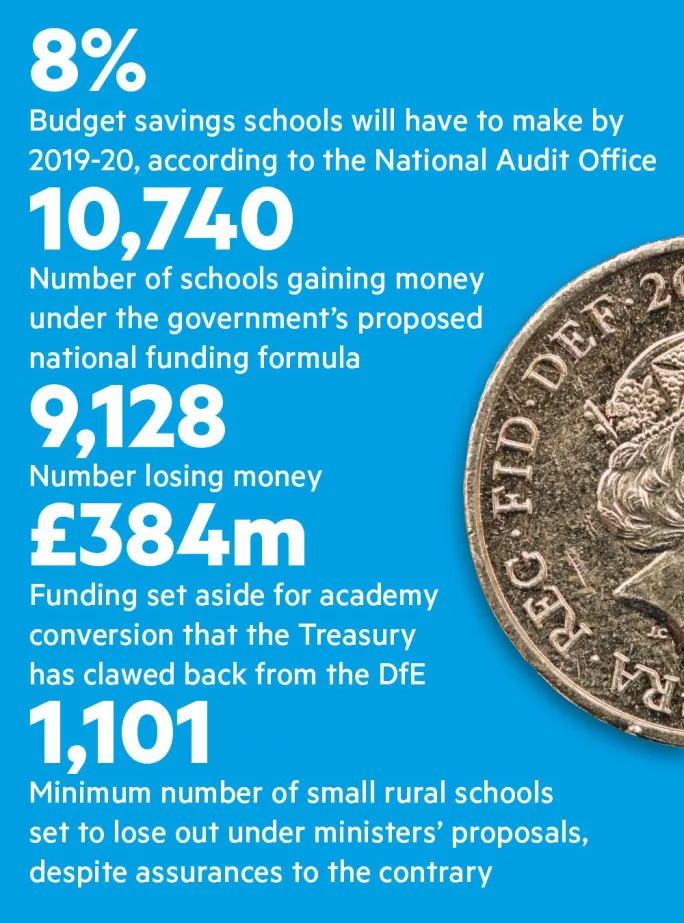Pisa boss: England’s cuts will hurt school standards

One of the most influential figures in world education has added his voice to warnings that financial pressures on schools in England risk damaging standards.
Andreas Schleicher, education director at the Organisation for Economic Cooperation and Development (OECD), which publishes the Pisa (Programme for International Student Assessment) world rankings, voiced concerns over schools struggling to make budget savings of 8 per cent to cope with increasing cost pressures.
Thousands of schools are also expected to have their government grant cut under the proposed national funding formula announced by ministers in December.
Asked by TES about the funding squeeze affecting schools in England, Mr Schleicher said: “If you take the same system and you take money out of it, you lose and lack in quality. I think there’s no question around it.”
He spoke out as politicians from around the globe gathered in London for the Education World Forum, where England’s schools minister Nick Gibb again cited Pisa research approvingly.
Mr Schleicher made his comments the day after headteachers warned the Commons Education Select Committee that the government was already cutting teaching to the “bare bones”, and amid a growing outcry from MPs of all parties about schools set to lose out under the new funding system.
Storm clouds have continued to gather this week over the plans, which Mr Gibb insisted on Tuesday were “all about fairness”.
School governors have threatened to go on “strike” in protest, and a TES analysis of academy chain accounts reveals the extent to which trusts have had to cut staff and raid school reserves to cope.
‘Investing in the future’
Mr Schleicher said that in high-performing education systems, such as China, parents and governments prioritised spending on educating children, adding that “they invest in the future”.
“The UK has already spent the money on consumption today,” he said. “That’s where the debt crisis came from. It’s a value choice of societies to make. Education really is an important choice; that is the future.
“The school system today is your economy tomorrow, and that is something I worry about when governments have an attitude of, ‘Oh well, let’s cut some corners here’.”
Neil Carmichael, chairman of the education committee, told TES that Mr Schleicher was “right on this”, adding that he had “huge respect” for the OECD official.
“Of course we need more resources in education,” Mr Carmichael said. “The debate is about how that can happen, given our appalling public sector deficit problem.”
The Conservative MP, who last week used a Commons debate on school funding to demand changes to the proposed system, said he was considering calling for “a new Keynesian approach”. He added: “Where [economist John Maynard] Keynes said 50 years ago ‘build houses’, I think today the message has to be about education for our people.”

Mary Bousted, general secretary of the ATL teaching union, likened the school funding situation to a “pressure cooker at breaking point”, and described Mr Schleicher’s intervention as “significant”.
“It is interesting that Andreas Schleicher is prayed in aid often when the ministers think that [his] arguments will help their cause,” she added. “They just ignore the OECD when it does not support their case.
“[Education secretary] Justine Greening is in a very tight corner. The DfE has made it clear that there is no more money. Parents are going to start to notice the consequences.”
However, Mr Schleicher said the overall level of funding was not the only issue, and called for schools to do more with the money they received.
“I think schools should also see themselves as becoming more innovative in the way they utilise resources,” Mr Schleicher told TES. “I don’t think we should fund schools less, but we should expect better outcomes for current levels of funding, and we should see that the money that arrives makes the most difference. That’s a continuous strive.”
The DfE said it had protected “core school funding”, which was at a record level, and that it was “incorrect” to say it was taking money out of the system
The department added that total expenditure from public and private sources on UK education institutions was above the OECD average for each phase of education.
A spokesperson said: “We recognise, however, that schools are facing cost pressures, which is why we will continue to provide advice and support to help them use their funding in cost-effective ways, including improving the way they buy goods and services, so they get the best possible value for their pupils.”
You need a Tes subscription to read this article
Subscribe now to read this article and get other subscriber-only content:
- Unlimited access to all Tes magazine content
- Exclusive subscriber-only stories
- Award-winning email newsletters
Already a subscriber? Log in
You need a subscription to read this article
Subscribe now to read this article and get other subscriber-only content, including:
- Unlimited access to all Tes magazine content
- Exclusive subscriber-only stories
- Award-winning email newsletters